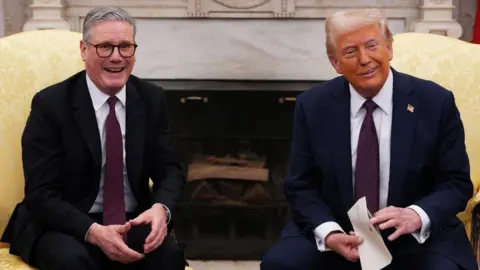In a significant diplomatic and economic development, the United States and the United Kingdom have reached an agreement that will reduce tariffs on a specific number of British vehicles and allow some steel and aluminum imports from the UK without tariff penalties. This deal, negotiated amidst the backdrop of strained trade relationships, particularly influenced by the previous US administration’s policies, aims to provide relief to key UK industries affected by the tariffs imposed by former President Donald Trump since he took office in January 2025.
The newly announced arrangement will maintain a 10% tariff on a majority of goods imported from the UK, which analysts believe does not considerably change the existing terms of trade. It is important to note that while the deal was celebrated by political leaders in both nations, industry analysts expressed skepticism regarding its long-term efficacy and the tangible benefits it would bring to the economies involved, given the constraints imposed by the retained tariffs.
The announcement, made without a formal signing ceremony, was characterized by UK Prime Minister Keir Starmer as a “fantastic platform” for future collaboration. Speaking from a Jaguar Land Rover facility in the West Midlands, Starmer highlighted the agreement’s potential to boost the UK automotive industry. President Trump, addressing the media from the White House shortly after the announcement, acclaimed the deal as “great” and defended its significance against detractors who suggested it was overstated. He indicated a desire to expand the agreement in the future.
Details of the tariff cuts indicate the US has consented to lower the import tax on up to 100,000 British cars annually from 25% to 10%. This shift is particularly beneficial for UK luxury car manufacturers, including prestigious brands like Jaguar Land Rover and Rolls Royce. However, the quota of 100,000 reflects the approximate number of vehicles the UK exported to the US last year, raising questions about the agreement’s capacity to spur growth beyond current levels.
In terms of steel and aluminum, the agreement stipulates reductions in tariffs, which had previously been raised by Trump’s administration. The UK Prime Minister’s Office has also mentioned a “reciprocal access” deal for beef exports whereby UK farmers would have a quota of 13,000 metric tonnes to export to the US. However, the specifics of this arrangement, including any anticipated US expansions in beef and agricultural product exports to the UK, lacked confirmation from the White House.
US Agriculture Secretary Brooke Rollins highlighted that the arrangement could yield a $5 billion opportunity for American exports, encompassing $700 million in ethanol and $250 million in assorted agricultural goods. While industry leaders such as Gareth Stace, Director General of UK Steel, hailed the agreement as offering substantial relief to the sector, opinions among business groups remained mixed. Some expressed uncertainty about the agreement’s potential impact compared to pre-tariff conditions, with some critics in the UK regarding it as insufficient.
The discussions leading up to this agreement had been ongoing since the beginning of Trump’s first term. Unfortunately, political hurdles, particularly regarding agricultural and pharmaceutical trade, had previously stalled progress. While the National Cattlemen’s Beef Association welcomed the agreement for American ranchers as “tremendous,” other organizations like the US Meat Export Federation remained cautious and sought further clarification on the deal’s terms.
Additionally, the agreement did not appear to include any time-sensitive concessions regarding pharmaceutical imports, an area that Trump had indicated he wished to address with potential tariffs to bolster domestic manufacturing capabilities. Although the US has signaled an intention to prioritize British firms for imports, details of what this preferential treatment will entail are still awaited, illustrating the complexity and nuance of international trade negotiations.
Overall, while the US-UK tariff agreement offers some strategic benefits and improvements over existing trade policies, significant challenges and uncertainties remain regarding its actual impact on long-term economic relations between the two nations.



